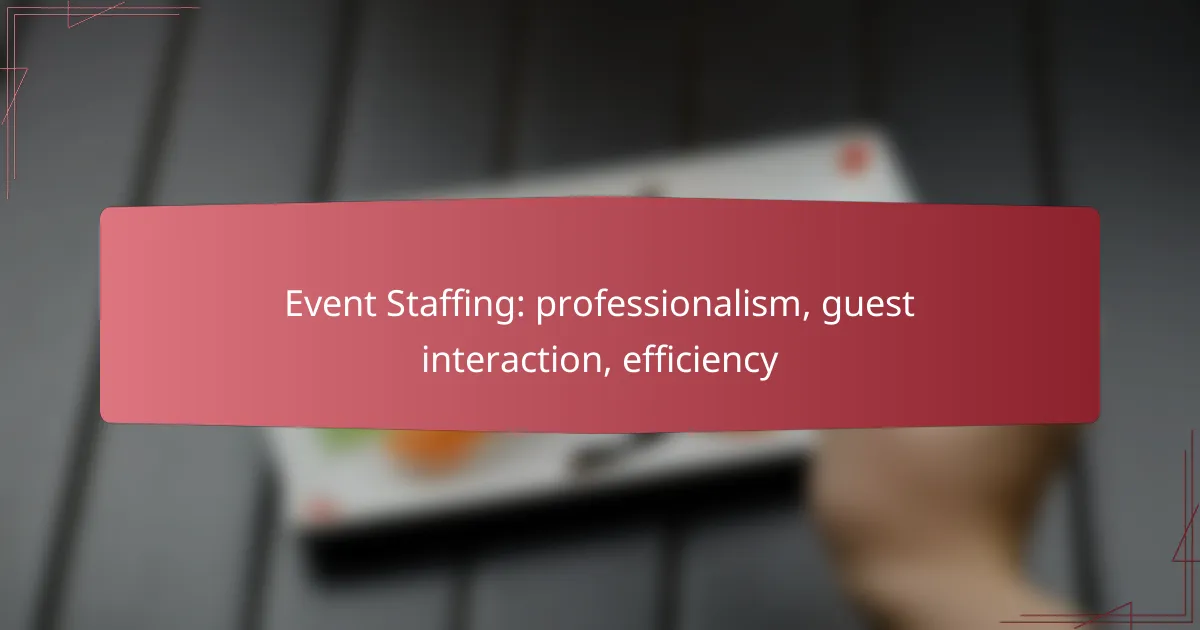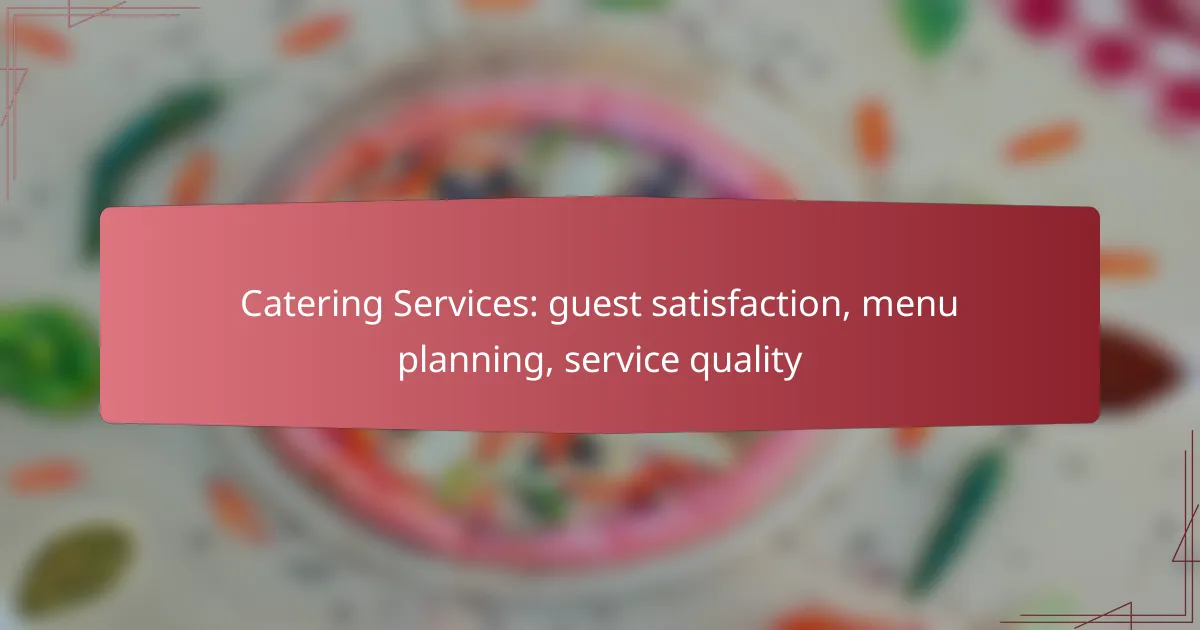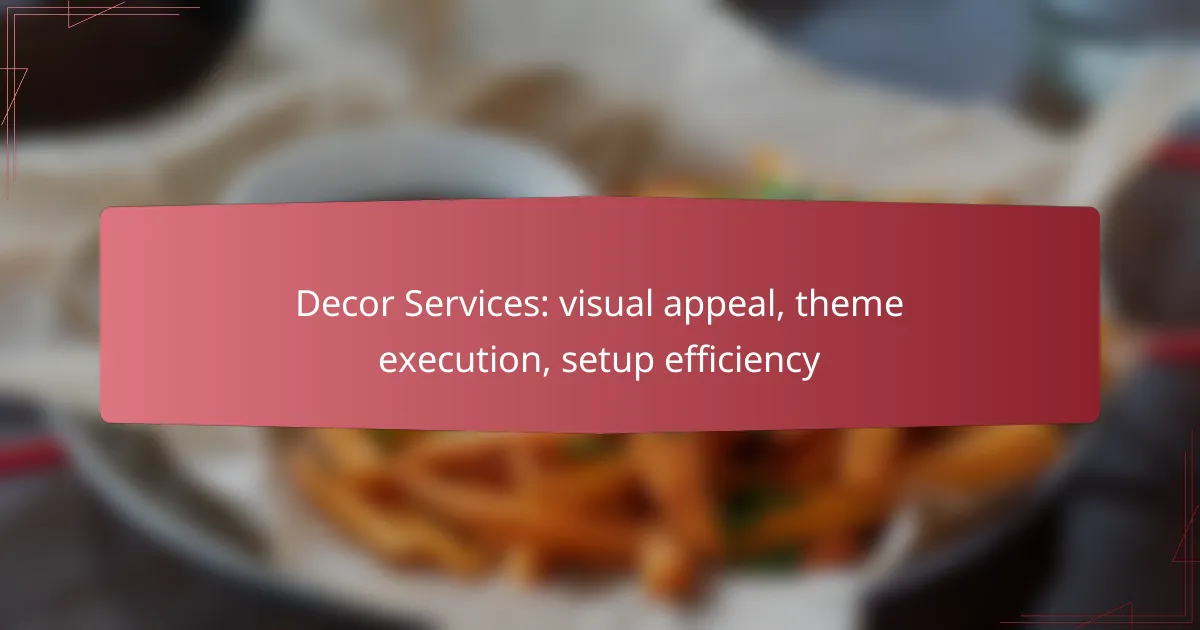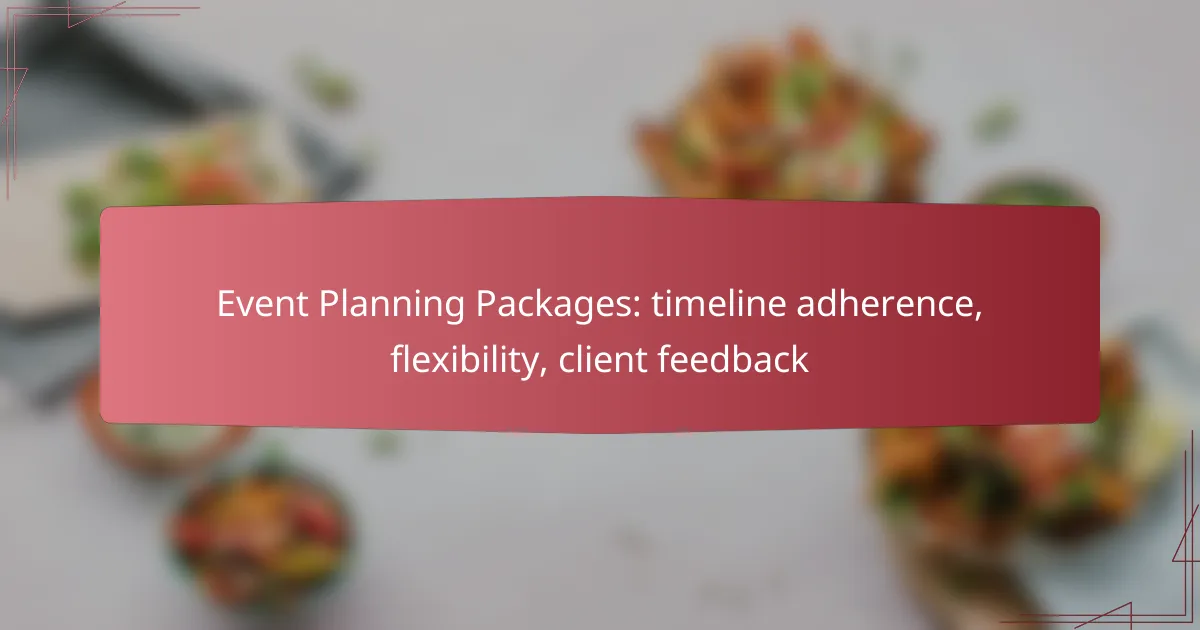Event staffing plays a vital role in elevating the professionalism and efficiency of events in London. By ensuring well-trained staff engage positively with guests, events can achieve a smooth operation and create memorable experiences. This focus on professionalism not only enhances guest interaction but also reflects the high standards expected in a bustling city environment.

How can event staffing enhance professionalism in London?
Event staffing can significantly enhance professionalism in London by ensuring that events are managed smoothly and guests receive exceptional service. Well-trained staff create a positive atmosphere, reflecting the high standards expected in this vibrant city.
Trained staff for high standards
Having trained staff is crucial for maintaining high standards at events. These professionals are equipped with the skills to handle various situations, from managing guest inquiries to ensuring smooth logistics. In London, where events can be large and complex, having knowledgeable staff can make a substantial difference.
Consider investing in training programs that focus on customer service, conflict resolution, and event-specific protocols. This preparation helps staff respond effectively to challenges, enhancing the overall guest experience.
Uniforms and branding for consistency
Uniforms and branding play a vital role in creating a consistent and professional image at events. When staff wear coordinated attire, it not only identifies them as representatives of the event but also instills confidence in guests. In London, where first impressions matter, this visual consistency can enhance the perceived quality of the event.
Choose uniforms that align with the event’s theme and branding. This could range from formal attire for corporate events to more casual outfits for festivals. Ensure that all staff members are well-groomed and adhere to the dress code to maintain a polished appearance throughout the event.
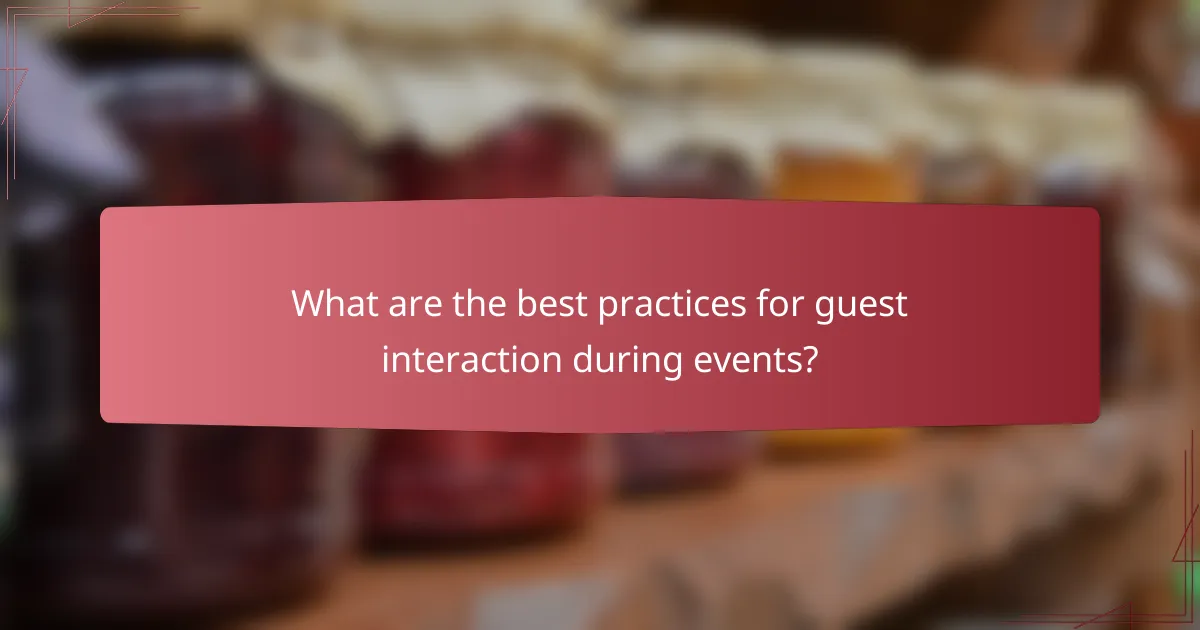
What are the best practices for guest interaction during events?
Effective guest interaction during events hinges on professionalism, attentiveness, and a welcoming demeanor. Implementing best practices can enhance the overall experience for attendees and foster positive impressions of the event.
Personalized greetings and assistance
Personalized greetings set a positive tone for guest interactions. Staff should address attendees by name whenever possible and offer tailored assistance based on individual needs. For example, if a guest appears lost, staff should proactively offer directions or escort them to their destination.
Using a friendly tone and maintaining eye contact can further enhance the personal touch. Simple gestures, such as a warm smile or a handshake, can make guests feel valued and welcomed. Consider training staff to recognize and respond to various guest demographics, ensuring that all interactions are respectful and appropriate.
Active listening and engagement techniques
Active listening is crucial for understanding guest needs and concerns. Staff should focus on what guests are saying, nodding and responding appropriately to show they are engaged. This not only builds rapport but also helps in addressing any issues that may arise during the event.
Engagement techniques can include asking open-ended questions to encourage dialogue and providing thoughtful responses. For instance, instead of asking if a guest is enjoying the event, staff could inquire about their favorite aspect so far. This approach fosters a more meaningful connection and can lead to valuable feedback for future events.
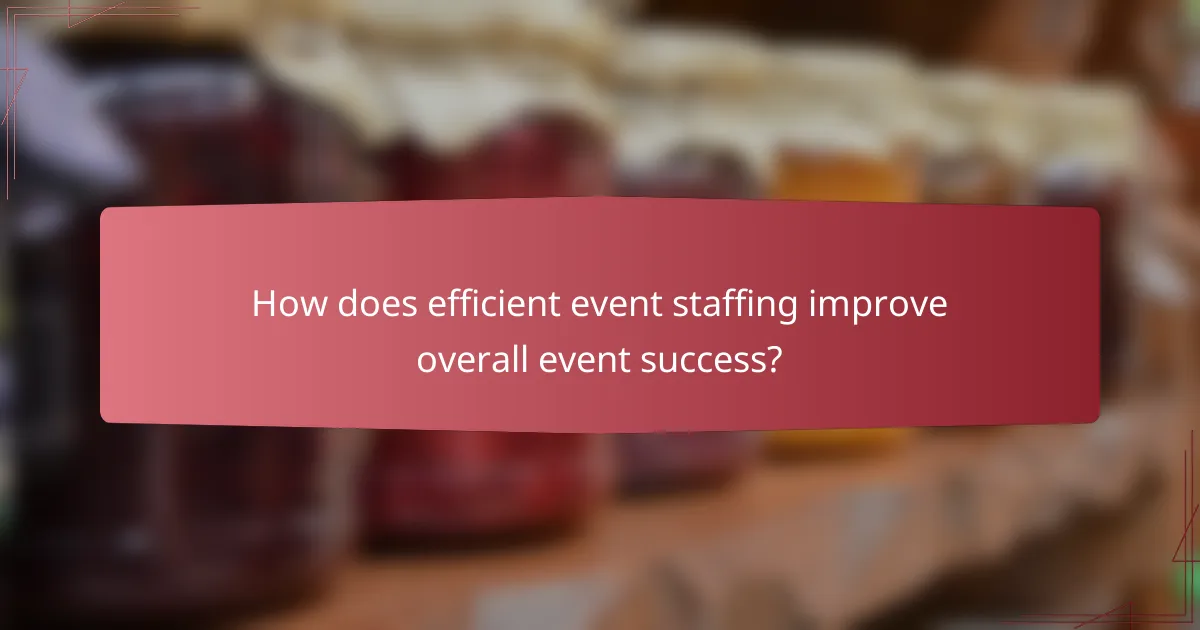
How does efficient event staffing improve overall event success?
Efficient event staffing is crucial for enhancing overall event success by ensuring that operations run smoothly and guests receive timely assistance. When staff members are well-coordinated and trained, they can effectively manage tasks, leading to a more enjoyable experience for attendees.
Streamlined operations for better flow
Streamlined operations are essential for maintaining a seamless flow throughout an event. This involves clearly defining roles and responsibilities for each staff member, which minimizes confusion and delays. For example, having designated teams for registration, catering, and guest services can significantly enhance efficiency.
To achieve streamlined operations, consider implementing a checklist for staff duties and conducting pre-event briefings. This preparation helps ensure that everyone understands their tasks and can adapt quickly to any changes, ultimately improving the event’s overall pace and guest satisfaction.
Quick response to guest needs
Quick responses to guest needs are vital for creating a positive event atmosphere. When staff members are trained to anticipate and address guest inquiries or issues promptly, it fosters a welcoming environment. For instance, having a dedicated guest services team can ensure that any concerns are resolved within minutes.
To enhance responsiveness, staff should be equipped with communication tools, such as walkie-talkies or mobile apps, allowing them to relay information quickly. Regular check-ins during the event can also help identify potential issues before they escalate, ensuring that guests feel valued and attended to throughout their experience.
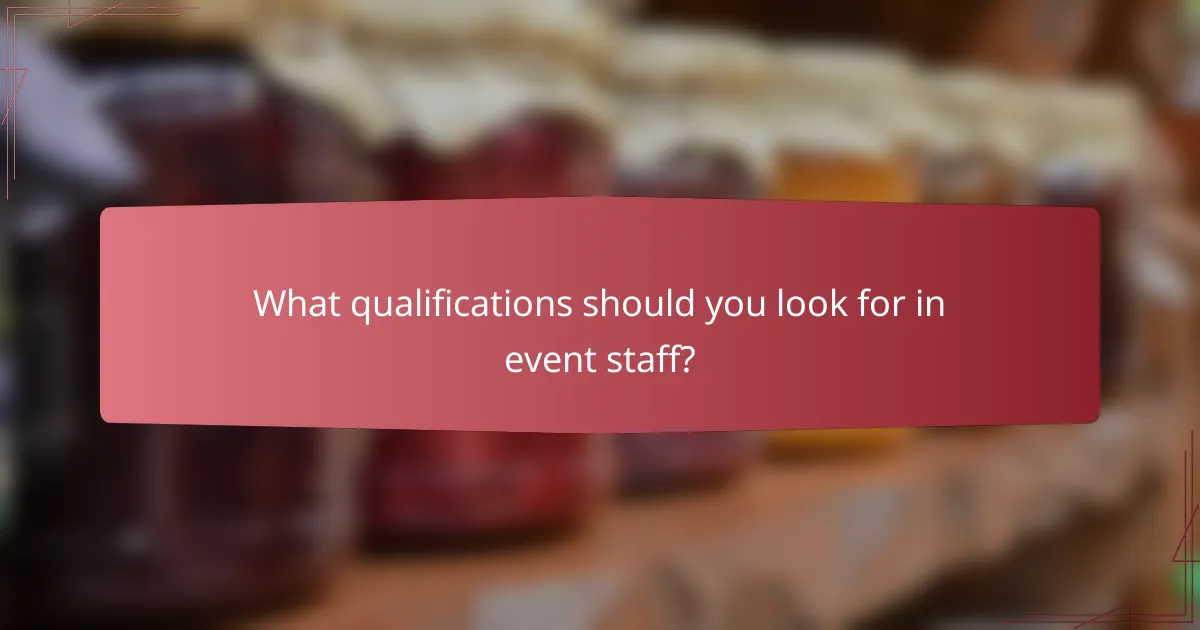
What qualifications should you look for in event staff?
When hiring event staff, prioritize qualifications that enhance professionalism, guest interaction, and efficiency. Look for candidates with relevant experience and certifications that demonstrate their ability to provide excellent service in a fast-paced environment.
Experience in hospitality or events
Experience in hospitality or events is crucial for effective event staff. Candidates with a background in these fields are typically familiar with the demands of managing guest interactions and ensuring smooth operations. Look for individuals who have worked in roles such as servers, coordinators, or event assistants.
Consider the type of events you are hosting when evaluating experience. For instance, staff experienced in corporate events may excel in professionalism and efficiency, while those with a background in social events might be better at guest engagement. Aim for candidates who have a proven track record of handling similar events successfully.
Certification in customer service
Certification in customer service can significantly enhance the qualifications of event staff. These certifications often cover essential skills such as communication, conflict resolution, and guest relations, which are vital for creating a positive event experience. Look for certifications from recognized organizations that demonstrate a commitment to high service standards.
When assessing candidates, inquire about their specific training and how they apply it in real-world scenarios. For example, staff trained in customer service may handle difficult situations more effectively, leading to improved guest satisfaction. Prioritize candidates who can demonstrate their skills through examples from past roles or training sessions.
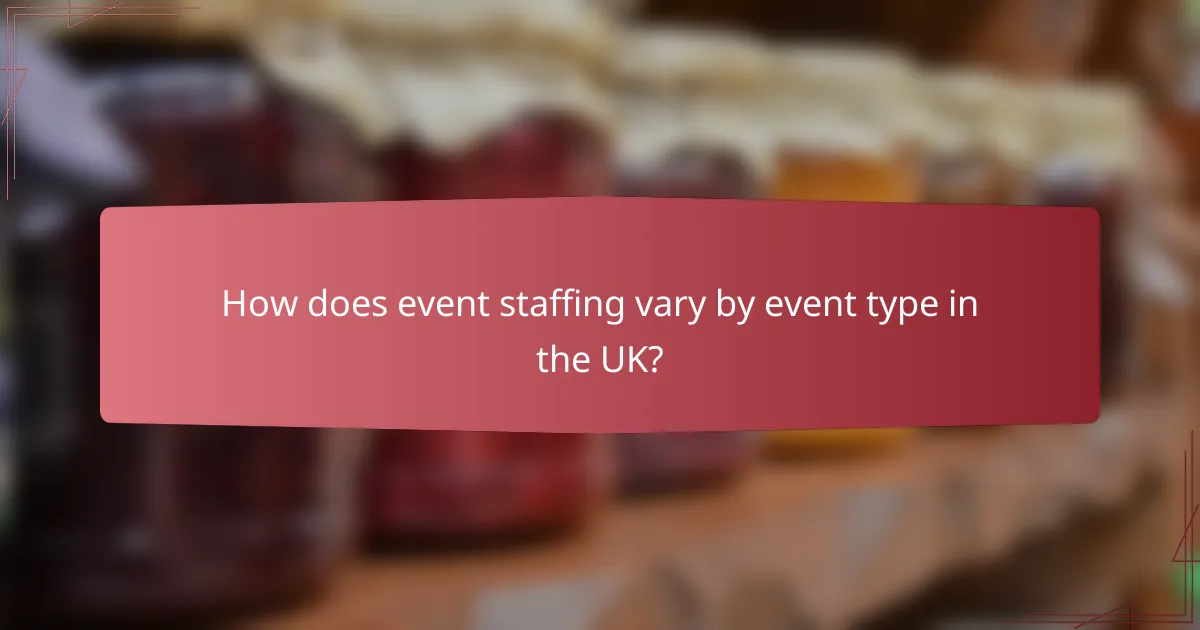
How does event staffing vary by event type in the UK?
Event staffing in the UK varies significantly based on the type of event, with distinct requirements for skills, guest interaction, and overall professionalism. Understanding these differences is crucial for ensuring a successful event experience for both hosts and attendees.
Corporate events require different skills
Corporate events typically demand staff with strong organizational skills and a professional demeanor. Event staff should be adept at managing schedules, facilitating networking opportunities, and providing technical support for presentations and equipment.
For instance, staff at a corporate conference may need to handle registration, assist with audiovisual setups, and ensure smooth transitions between sessions. It’s essential to train staff on company protocols and branding to maintain a cohesive image throughout the event.
Weddings focus on personal touch
Weddings prioritize a personal touch, requiring staff who excel in guest interaction and emotional intelligence. Event staff should be attentive, approachable, and capable of anticipating the needs of both the couple and their guests.
For example, wedding coordinators often assist with seating arrangements, manage timelines, and ensure that special requests are fulfilled. Staff should be trained to handle sensitive situations gracefully, creating a memorable experience that reflects the couple’s vision.
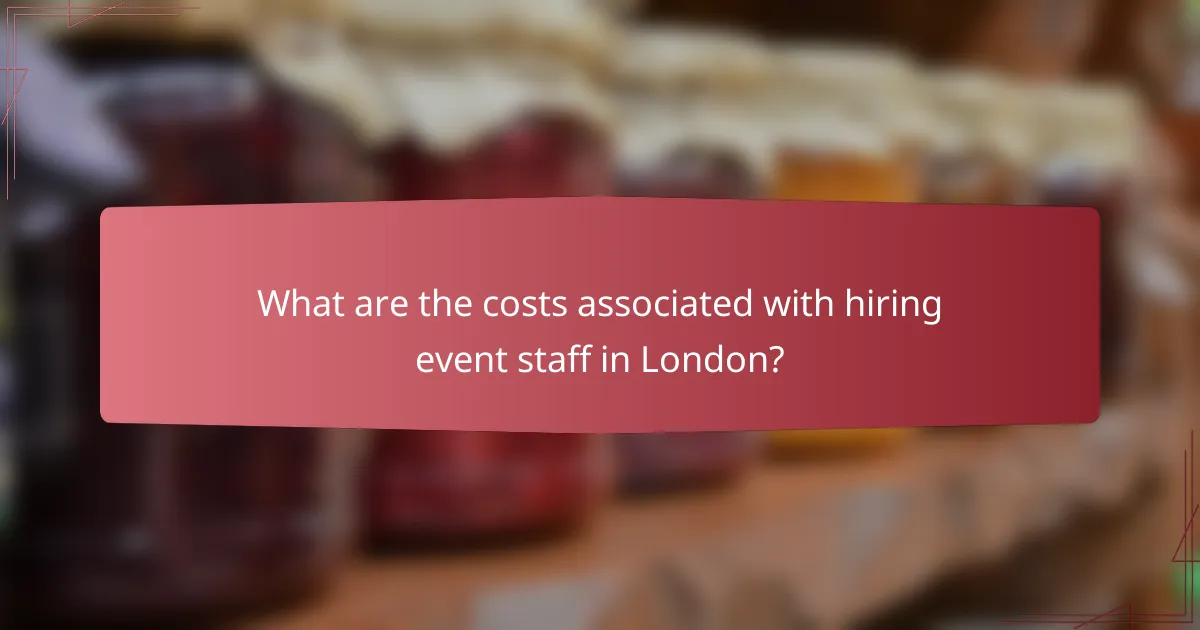
What are the costs associated with hiring event staff in London?
The costs of hiring event staff in London can vary significantly based on the type of event, the level of expertise required, and the duration of service. Typically, you can expect to pay anywhere from £10 to £30 per hour for temporary staff, with additional costs for specialized roles or package deals for larger events.
Hourly rates for temporary staff
Hourly rates for temporary staff in London generally range from £10 to £30, depending on the role and experience level. For example, general event staff may charge around £10 to £15 per hour, while more skilled positions, such as security personnel or event coordinators, can command rates of £20 to £30 per hour.
When budgeting for staff, consider factors like the duration of the event and any additional costs such as travel or meals. It’s advisable to confirm rates in advance and ensure that all fees are clearly outlined in the contract.
Package deals for larger events
For larger events, many staffing agencies in London offer package deals that can provide cost savings compared to hiring staff individually. These packages often include a set number of staff members for a flat fee, which can be more economical for events requiring multiple personnel.
When exploring package options, assess what services are included, such as training, uniforms, and on-site management. Comparing different agencies can help you find the best value while ensuring you meet your event’s staffing needs effectively.
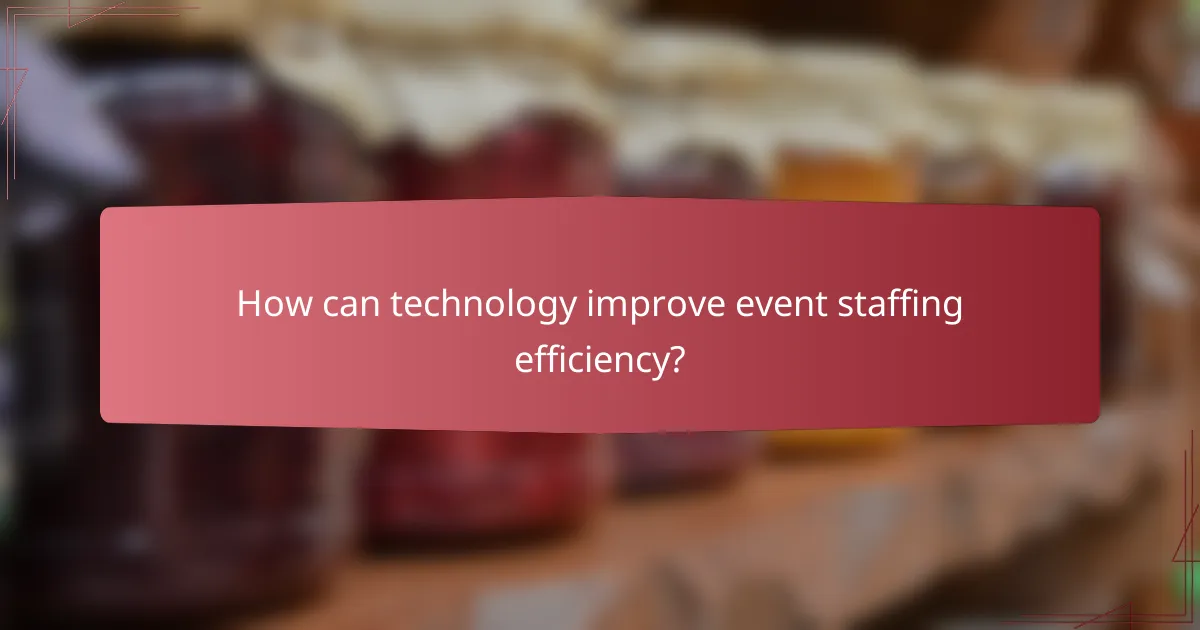
How can technology improve event staffing efficiency?
Technology enhances event staffing efficiency by streamlining processes, improving communication, and optimizing resource allocation. By leveraging various tools, event planners can ensure that staff are well-coordinated and tasks are executed smoothly.
Staff scheduling software
Staff scheduling software automates the process of assigning shifts and managing availability, which significantly reduces administrative workload. These tools allow event managers to quickly create schedules that accommodate staff preferences and qualifications, ensuring the right personnel are in place for each event.
When selecting scheduling software, consider features like mobile access, integration with payroll systems, and the ability to handle last-minute changes. Popular options include Deputy, When I Work, and Shiftboard, which cater to various event sizes and types.
Real-time communication tools
Real-time communication tools facilitate instant messaging and updates among event staff, enhancing coordination and responsiveness. Platforms like Slack or Microsoft Teams enable quick sharing of information, which is crucial during dynamic events where conditions can change rapidly.
To maximize the effectiveness of these tools, establish clear communication protocols and ensure all staff are trained on how to use the chosen platform. Regular check-ins through these tools can help identify issues early and keep everyone aligned on event goals.
